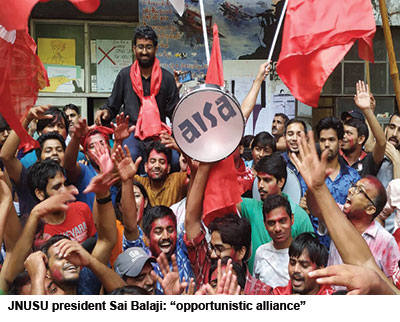 Last month two significant and keenly anticipated elections for control of the Delhi University Students Union (DUSU) and Jawaharlal Nehru University Students Union (JNUSU) produced contrasting results which are being interpreted as forerunners of General Election 2019 scheduled for next summer.
Last month two significant and keenly anticipated elections for control of the Delhi University Students Union (DUSU) and Jawaharlal Nehru University Students Union (JNUSU) produced contrasting results which are being interpreted as forerunners of General Election 2019 scheduled for next summer.
The 135,000 (44 percent turnout) members of DUSU who voted on September 12, returned candidates backed by the RSS-affiliated Akhil Bharatiya Vidyarthi Parishad (ABVP) to three key positions of the president (Ankiv Basoya), vice president (Shakti Singh) and joint secretary (Jyoti Choudhary). Congress’ student wing NSUI (National Students Union of India) nominee, Aakash Choudhary bagged the secretary’s post in the 11-member executive council of DUSU. The Aam Aadmi Party’s (AAP) student wing, the Chhatra Yuva Sangharsh Samiti and communist/socialist-backed All India Students Association drew a blank. Significantly, 27,739 voted NOTA (none of the above).
In JNUSU elections held on September 14, a United Left alliance comprising the All India Students Association (AISA), Students Federation of India (SFI), Democratic Students Federation (DSF) and All India Students Federation (AISF) swept the polls by huge margins. N. Sai Balaji of JNU’s school of international studies is the new president. Sarika Choudhary of the school of social sciences (centre for informal sector and labour studies) is vice president, Aejaj Ahmed of the school of social sciences (centre for historic studies) is the new general secretary and Amutha Jayadeep of the school of social sciences is joint secretary. In all, 5,000 members of the JNUSU cast their ballots.
Although JNU is a bastion of Left ideologies that have been discredited worldwide and most spectacularly in West Bengal — until the 1970s, India’s most academically and industrially advanced state — which during 34 years of uninterrupted rule (1977-2011) of the CPM (Communist Party of India)-led Left Front was de-industrialised and reduced to penury, most academics concede that JNU — ranked the country’s #2 university in the Union HRD ministry’s National Institutional Rankings Framework, 2018 — is also India’s most intellectual university in which national policies and programmes are seriously debated. Therefore, the leadership of the BJP, of which ABVP is the students wing, is reported to have derived considerable satisfaction from its sizeable vote share in this ‘last bastion’ of the Left.
“ABVP, through years of activism, has grown into a largest single organisation on campus. Let’s face it. On a one-on-one basis, ABVP outnumbers every other organisation electorally. It’s this fear of electoral annihilation at the hands of an ascendant ABVP that forced four student unions (AISA, SFI, AISF, DSF) to forge an opportunistic alliance called the United Left Alliance in the first place. Subsequently, the post-poll violence was aimed at striking fear into the heart of ABVP and demobilising it psychologically as well as politically… JNU is the last refuge for the Left and a final frontier for ABVP. The battle is going to be intense,” writes Shreejay Sinha, Delhi-based journalist in Firstpost.com (September 22), an online magazine.
From being purely student welfare organisations, student unions have become increasingly politicised especially after the Emergency and implementation of the Mandal Commission Award in 1992. Although in 2006 after the Lyngdoh Committee’s report (2005), several governments at the Centre and the states attempted to de-politicise students’ unions, as the latest DUSU and JNUSU elections — in which big money and major political parties were involved — prove, that attempt has failed.
The first volley in the new Left vs. Right war to win the hearts and minds of India’s 30 million students in higher education was fired two years ago on February 9, 2016 when the then JNUSU president Kanhaiya Kumar and several of his associates were arrested on the JNU campus by the BJP government at the Centre and charged with sedition. With the Left alliance winning the JNUSU election for the second year consecutively, Kanhaiya Kumar and his associates Umar Khalid and Shelha Rashid have emerged as high-potential leaders in national politics.
And although some academics and elders deplore this development, the general consensus within academia is that college and universities are preparatory institutions for tomorrow’s political leaders who shouldn’t be insulated from the hurly burly of politics beyond campus gates.
Autar Nehru (Delhi)


























